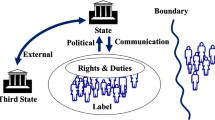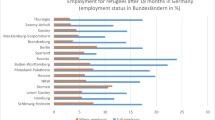Abstract
This article presents an analysis of the multiple purposes of citizenship regimes in 36 states in Europe. Previous studies on this topic suffer from two methodological deficits that lead to an incomplete perspective on how states regulate citizenship status: they emphasise the importance of static national membership models and focus nearly exclusively on the access to citizenship for immigrants. To overcome these deficits, we develop a citizenship regime typology based on functional components of citizenship laws, focusing on acquisition as well as loss, inside as well as outside the territory of a state. We find that citizenship regimes in Europe configure along two dimensions that can be associated with territorial and ethnocultural inclusion, which result in four types: territorially and ethnoculturally selective regimes that are inclusive on only one of these dimensions, expansive regimes that are inclusive on both dimensions and insular regimes that restrict both inclusions.


Similar content being viewed by others
References
Aleinikoff, T.A. and Klusmeyer, D. (eds.) (2000) From Migrants to Citizens: Membership in a Changing World. Washington DC: Carnegie Endowment for International Peace.
Aleinikoff, T.A. and Klusmeyer, D. (eds.) (2001) Citizenship Today: Global Perspectives and Practices. Washington DC: Carnegie Endowment for International Peace.
Bauböck, R. (1994) Transnational Citizenship. Membership and Rights in International Migration. Aldershot, UK: Edward Elgar.
Bauböck, R. (2001) Recombinant Citizenship. In: M. Kohli and A. Woodward (eds.) Inclusions and Exclusions in European Societies. London: Routledge, pp. 38–58.
Bauböck, R., Ersbøll, E., Groenendijk, K. and Waldrauch, H. (eds.) (2006a) Acquisition and Loss of Nationality. Policies and Trends in 15 European States. Volume 1: Comparative Analyses. Amsterdam, The Netherlands: Amsterdam University Press.
Bauböck, R., Ersbøll, E., Groenendijk, K. and Waldrauch, H. (eds.) (2006b) Acquisition and Loss of Nationality. Policies and Trends in 15 European States. Volume 2: Country Analyses. Amsterdam, the Netherlands: Amsterdam University Press.
Bauböck, R., Perchinig, B. and Sievers, W. (eds.) (2007) Citizenship Policies in the New Europe. Amsterdam, The Netherlands: Amsterdam University Press.
Blatter, J. (2011) Dual Citizenship and Theories of Democracy. Citizenship Studies 15 (6/7): 769–798.
Bloemraad, I. (2006) Becoming a Citizen: Incorporating Immigrants and Refugees in the United States and Canada. Los Angeles, CA: University of California Press.
British Council and Migration Policy Group. (2011) Migrant Integration Policy Index. Brussels, Belgium: British Council and Migration Policy Group.
Brubaker, R. (1992) Citizenship and Nationhood in France and Germany. Cambridge, MA: Harvard University Press.
Brubaker, R. (1998) Myths and misconceptions in the study of nationalism. In: M. Moore (ed.) National Self-Determination and Secession. Oxford: Oxford University Press, pp. 233–265.
Dahl, R. (1989) Democracy and Its Critics. New Haven: Yale University Press.
De Groot, G.R. and Vonk, O. (2012) Nationality, statelessness and ECHR’s article 8: Comments on Genovese v. Malta. European Journal of Migration and Law 14: 317–325.
De Hart, B. and van Oers, R. (2006) European trends in nationality law. In: R. Bauböck, E. Ersbøll, K. Groenendijk and H. Waldrauch (eds.) Acquisition and Loss of Nationality. Policies and Trends in 15 European States. Volume 1: Comparative Analyses. Amsterdam, the Netherlands: Amsterdam University Press, pp. 317–357.
Dronkers, J. and Vink, M. (2012) Explaining access to citizenship in Europe: How policies affect naturalisation rates. European Union Politics 13 (3): 390–412.
Dzankic, J. (2012) The Pros and Cons of Ius Pecuniae: Investor Citizenship in Comparative Perspective. RSCAS Working Paper 2012/14, EUI: Florence, Italy.
Faist, T. (ed.) (2007) Dual Citizenship in Europe: From Nationhood to Societal Integration. Aldershot, UK: Ashgate.
Faist, T. and Kivisto, P. (2007a) Citizenship. Discourse, Theory, and Transnational Prospects. Oxford: Blackwell Publishing.
Faist, T. and Kivisto, P. (2007b) Dual Citizenship in Global Perspective. Basingstoke, UK: Palgrave Macmillan.
Favell, A. (2001) Philosophies of Integration: Immigration and the Idea of Citizenship in France and Britain. 2nd edn. Basingstoke, UK: Palgrave Macmillan.
Freeman, G.P. (2004) Immigrant incorporation in Western democracies. International Migration Review 38 (3): 945–969.
Hailbronner, K. and Martin, D. (eds.) (2003) Rights and Duties of Dual Nationals. Evolution and Prospects. The Hague, the Netherlands: Kluwer Law International.
Hansen, R. (2000) Citizenship and Immigration in Post-War Britain. Oxford: Oxford University Press.
Hansen, R. and Weil, P. (eds.) (2001) Towards a European Nationality: Citizenship, Immigration and Nationality Law in the EU. Basingstoke, UK: Palgrave Macmillan.
Howard, M.M. (2005) Variation in dual citizenship policies in the countries of the EU. International Migration Review 39 (3): 697–720.
Howard, M.M. (2009) The Politics of Citizenship in Europe. Cambridge, UK: Cambridge University Press.
Immigrant Council of Ireland. (2011) Living in Limbo: Migrants Experiences of Applying for Naturalisation in Ireland. Dublin, Ireland: Immigrant Council of Ireland.
Jacobs, D. and Rea, A. (2007) The end of national models? Integration courses and citizenship trajectories in Europe. International Journal on Multicultural Societies 9 (2): 1817–4574.
Janoski, T. (2010) The Ironies of Citizenship: Naturalisation and Integration in Industrialized Countries. Cambridge, UK: Cambridge University Press.
Jeffers, K., Honohan, I. and Bauböck, R. (2012) CITLAW Indicators: How to Measure the Purposes of Citizenship Laws. San Domenico di Fiesole, Italy: EUDO CITIZENSHIP Observatory.
Joppke, C. (2003) Citizenship between de- and re-ethnicization. Archives européennes de sociologie 44 (3): 429–458.
Joppke, C. (2005) Selecting by Origin: Ethnic Migration in the Liberal State. Boston, MA: Harvard University Press.
Joppke, C. (2007) Beyond national models: Civic integration policies for immigrants in Western Europe. West European Politics 30 (1): 1–22.
Kondo, A. (ed.) (2001) Citizenship in a Global World: Comparing Citizenship Rights for Aliens. Aldershot, UK: Palgrave Macmillan.
Koopmans, R., Michalowski, I. and Waibel, S. (2012) Citizenship rights for immigrants: National political processes and cross-national convergence in Western Europe, 1980–2008. American Journal of Sociology 117 (4): 1202–1245.
Koopmans, R., Statham, P., Giugny, M. and Passy, F. (2005) Contested Citizenship: Immigration and Cultural Diversity in Europe. Minneapolis, MN: University of Minnesota Press.
Linting, M., Meulman, J.J., Groenen, P.J.F. and Van der Kooij, J.J. (2007) Nonlinear principal components analysis: Introduction and application. Psychological Methods 12: 336–358.
Meulman, J.J. and Heiser, W.J. (2005) Categories 14.0. Chicago, IL: SPSS.
Nascimbene, B. (ed.) (1996) Nationality Laws in the European Union. London: Butterworths.
Schuck, P. (1998) The re-evaluation of American citizenship. In: C. Joppke (ed.) Challenge to the Nation-State: Immigration in Western Europe and the United States. Oxford: Oxford University Press, pp. 191–230.
Vink, M. and de Groot, G.R. (2010a) Birthright Citizenship: Trends and Regulations in Europe. Comparative Report RSCAS/EUDO-CIT-Comp. 2010/8. Florence, Italy: EUDO Citizenship Observatory, pp. 1–36.
Vink, M.P. and de Groot, G.-R. (2010b) Citizenship attribution in Western Europe: International framework and domestic trends. Journal of Ethnic and Migration Studies 36 (5): 713–734.
Vonk, O. (2012) Dual Nationality in the European Union. Leiden, the Netherlands: Martinus Nijhoff Publishers.
Waldrauch, H. (2006a) Acquisition of nationality. In: R. Bauböck, E. Ersbøll, K. Groenendijk and Waldrauch, H. (eds.) Acquisition and Loss of Nationality. Policies and Trends in 15 European States. Volume 1; Comparative Analysis Amsterdam, the Netherlands: Amsterdam University Press, pp. 121–182.
Waldrauch, H. (2006b) Loss of nationality. In: R. Bauböck, E. Ersbøll, K. Groenendijk and Waldrauch, H. (eds.) Acquisition and Loss of Nationality. Policies and Trends in 15 European States. Volume 1; Comparative Analysis Amsterdam, The Netherlands: Amsterdam University Press, pp. 183–219.
Waldrauch, H. and Hofinger, C. (1997) An index to measure the legal obstacles to the integration of migrants. New Community 23 (2): 271–286.
Walzer, M. (1983) Spheres of Justice. A Defense of Pluralism and Equality. New York: Basic Books.
Weil, P. (2001) Access to citizenship: A comparison of twenty-five nationality laws. In: T.A. Aleinikoff and D. Klusmeyer (eds.) Citizenship Today: Global Perspectives and Practices. Washington DC: Carnegie Endowment for International Peace, pp. 17–35.
Weil, P. (2002) Quest-ce qu’un Français: histoire de la nationalité française depuis la Révolution. Paris, France: Grasset.
Yack, B. (1996) The myth of the civic nation. Critical Review 10 (2): 193–211.
Acknowledgements
Earlier versions of this article were presented at the 18th International Conference of Europeanists (Barcelona, 20–22 June 2011) and the 6th ECPR General Conference (Reykjavik, 25–27 August 2011). We thank Jaap Dronkers, Marc Franklin, Marc Helbling, Enric Martinez-Herrera, Iseult Honohan, David Reichel, Rik Linssen and an anonymous reviewer for comments and feedback.
Author information
Authors and Affiliations
Corresponding author
Rights and permissions
About this article
Cite this article
Vink, M., Bauböck, R. Citizenship configurations: Analysing the multiple purposes of citizenship regimes in Europe. Comp Eur Polit 11, 621–648 (2013). https://doi.org/10.1057/cep.2013.14
Published:
Issue Date:
DOI: https://doi.org/10.1057/cep.2013.14




